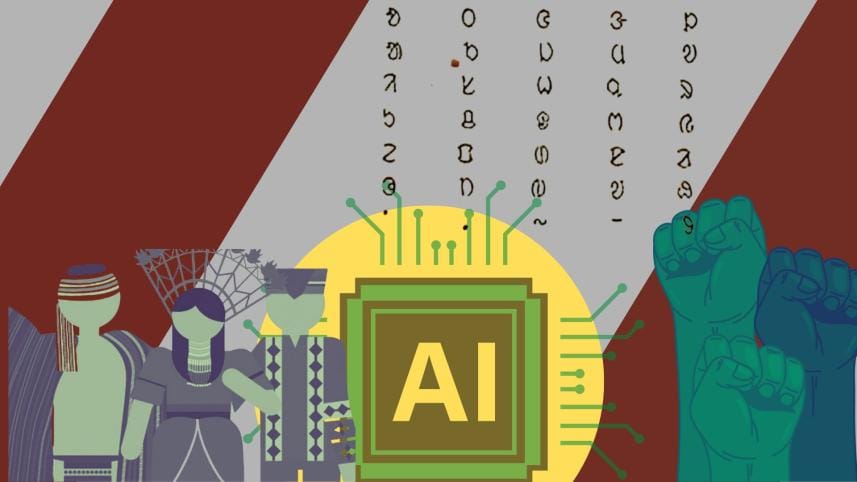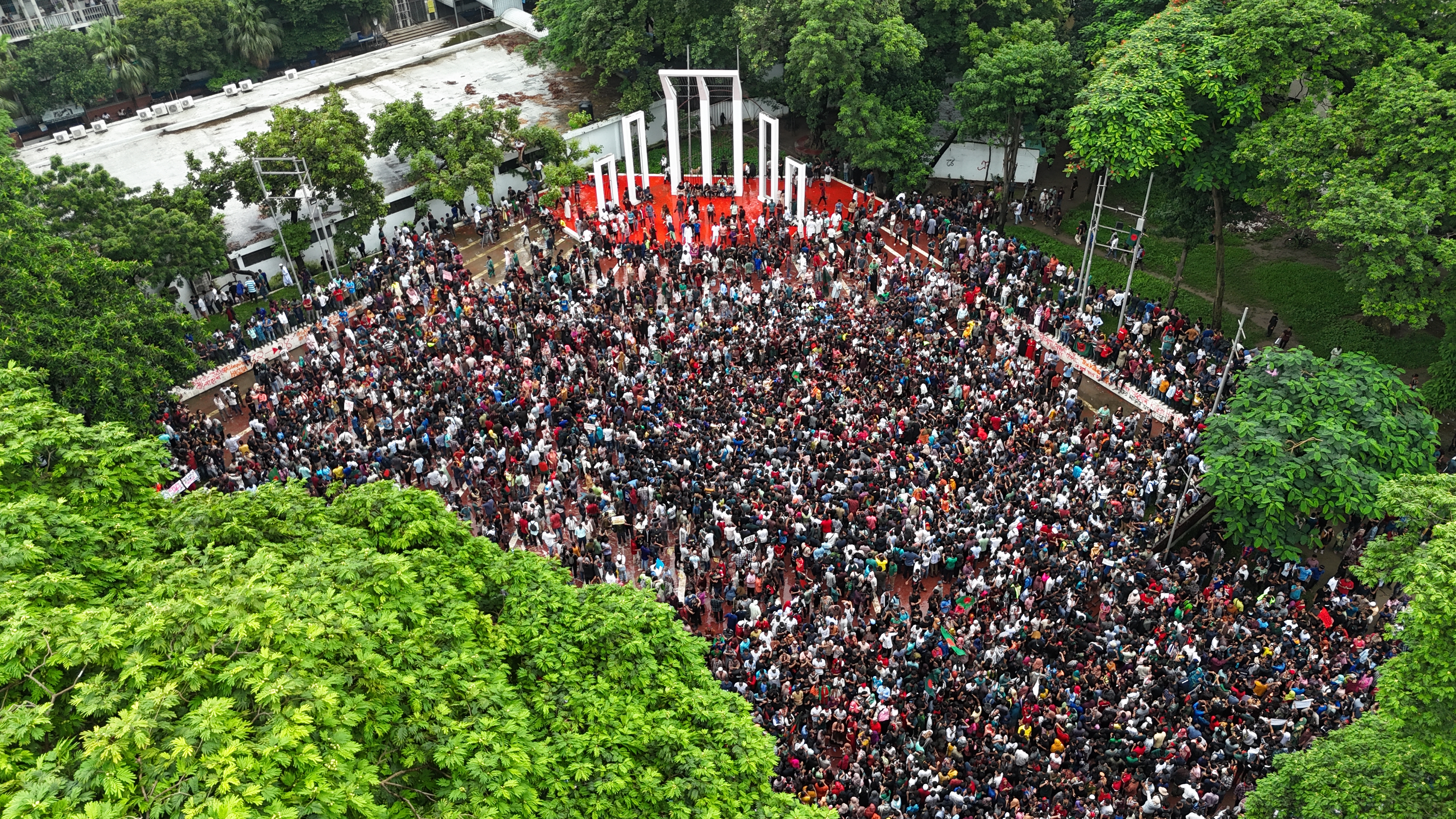Protecting indigenous knowledge in the age of AI

The International Day of the World's Indigenous Peoples this year is focused on the impact of artificial intelligence on indigenous rights, identities, and cultural and linguistic identity. AI is essentially a set of regulated algorithms, governed by global power structures and colonial legacies. As a result, existing AI models tend to obscure or misrepresent the knowledge and voices of indigenous communities. Consequently, such discriminatory AI models contribute to marginalisation and dispossession of indigenous societies.
Dr Maneesha Perera and others (2025) reviewed research on indigenous knowledge and AI, published between 2012 and 2023. They found a substantial body of work on indigenous knowledge offering a global indigenous perspective through intergenerational knowledge systems. At the same time, promising and aspirational research on AI has also been published. However, how these two strands of research intersect has not been discussed anywhere.
AI can play a crucial role in the development of indigenous knowledge. However, the potential risks to the indigenous knowledge systems must be considered as well. There is a risk of AI technology contributing to the erasure of indigenous cultural knowledge, committing biopiracy and violating the fundamental principles of indigenous data sovereignty. The expansion of AI technology could potentially exacerbate existing knowledge-based inequalities as well as structural discrimination.
In his address at the AI Action Summit 2025, UN Secretary-General António Guterres said, "AI has gone from the stuff of science fiction to a powerful force that is transforming our world. Reshaping the way we live, work, and interact. Fuelling breakthroughs in education, healthcare, agriculture." However, he cautioned that with this tremendous potential comes significant risks. "It (artificial intelligence) must accelerate sustainable development—not entrench inequalities," he warned.
Colonial plunder and biopiracy
Indigenous communities have been integral to nearly all geographic identifiers and elements of national pride in Bangladesh. Yet, their contributions remain othered, mostly invisible, in the national narrative and consciousness.
For example, Muslin and Jamdani, the signature fabrics of Bangladesh, used to be weaved using Phuti karpas, a cotton variety cultivated by indigenous communities in the Bhawal and Madhupur region. The sesame molasses of Kushtia originated from indigenous jhum cultivation at the Chittagong Hill Tracts (CHT). Even the puffed rice used to weave Tangail sarees came from the indigenous villages along the Sherpur-Jamalpur border. Indigenous communities have suffered due to colonial plunder and biopiracy, often in the name of control, governance, research, development or management.
Indigenous peoples are arguably the most researched population in the world. Today, in the name of scientific inquiry, "bioprospecting" and genetic research, their biological resources and the traditional knowledge systems tied to these resources are being appropriated and stolen. Indigenous communities and their biological resources are the main target of biocolonialism. These resources are being taken without their consent and turned into patented commercial products.
Sporadic discussions have now emerged about how indigenous data and knowledge can be integrated, represented, and utilised within the broader AI ecosystem. The indigenous movement for information sovereignty has persisted for years, emphasising the right to own, control, and manage their own data. However, powerful states and corporations are steering the direction of AI use to incorporate indigenous knowledge without ensuring the active inclusion of indigenous communities in decision-making and governance. This glaring absence poses a serious crisis, undermining the free flow of indigenous information and the commitment to prior informed consent. Particularly, the use of indigenous knowledge, data, images, or identities in AI frameworks—without consent or conditional participation—creates a disconnect between the indigenous peoples and the technologies being developed.
Hence, it is imperative to ensure active and respectful inclusion of indigenous peoples at every level of AI development. If there are any discrepancies regarding any content, they can flag and resolve such complexities at the outset.
Decisions and governance over how AI models incorporate the genetic and cultural information of indigenous jhum crops and wild food sources must align with the traditional indigenous traditional systems. Otherwise, there will be a risk of unilateral commercial exploitation of these traditional knowledge systems.
Marginalisation, discrimination, and universal human rights
During the first wave of COVID pandemic, racism against indigenous communities spiked in the country, particularly on social media, as speculations about the virus originating from a "wildlife market" in Wuhan, China spread. Digital technologies failed to prevent the racism targeting them. The current AI frameworks have yet to set compelling examples of eliminating discrimination or safeguarding indigenous rights. In March 2024, a caution was raised at the UN General Assembly that AI must respect, protect, and promote human rights and fundamental freedoms. Respect for indigenous rights can serve as a powerful opportunity for AI technologies to curb widespread inequalities and risks. Without comprehensive safeguards, AI technologies are more likely to deepen digital inequalities than to create positive opportunities for indigenous peoples. At the 24th session of the UN Permanent Forum on Indigenous Issues in 2021, a resolution was adopted to ensure meaningful inclusion of indigenous peoples in all aspects of AI development, application, and governance.
In Bangladesh's case, discussions around AI technologies must give due importance to the knowledge, values, and rights of indigenous peoples. The country must adopt AI governance policies that are aligned with the UN Declaration on the Rights of Indigenous Peoples, global AI principles, and the values enshrined in the Universal Declaration of Human Rights. Such frameworks must ensure that indigenous peoples are not confined within digital boundaries or subjected to renewed oppression through neo-colonial or binary systems imposed on them.
Neoliberal AI commerce and the alarming environmental question
The environmental question is emerging as a central concern in the field of AI. The massive data centres required for AI model research, development, and expansion demand an enormous amount of energy. Evidence suggests that the raw materials for energy production—fossil fuels—are often extracted from indigenous territories, putting entire ecosystems at risk. Multinational mining operations linked to AI technologies have left the indigenous Atacameño territories in Chile endangered and devastated. Lithium and copper—key minerals used in digital hardware and electric supply systems—are being extracted from these indigenous territories. Reports indicate that the data centres release vast amounts of mercury, lead, and other toxic materials, causing severe public health risks.
Indigenous communities in Bangladesh live under severe environmental stress. The people of the hills have grown up with the wounds inflicted by the Kaptai hydropower development project. From Phulbari to Lawachhara, from Lama to Bagdafarm, indigenous homesteads and their lives, nature, environment and ecology have been damaged by the so-called development projects. Natural forests have been cleared in indigenous areas to plant aggressive monoculture plantations. These regions are constantly targeted for commercial extraction, putting indigenous villages from Sherpur to Moulvibazar at risk.
To safeguard the environment and ecosystems, the UNESCO Recommendation on the Ethics of AI (2021) urges that member-states and the business community take into account the direct and indirect environmental impacts of AI technologies at all levels. The massive carbon emissions and energy consumption associated with AI development, data infrastructure, and governance must be assessed to understand their environmental impact. We hope that Bangladesh will place the issues of life, nature, and environment at the centre of its AI governance strategies.
Global and national policies: The indigenous message
The theme for the International Day of the World's Indigenous Peoples 2025 is "Indigenous Peoples and AI: Defending Rights, Shaping Futures." UNESCO believes that AI technologies can be used in multiple ways to support indigenous peoples and can serve as tools for positive transformation. They can be particularly useful in revitalising endangered and disappearing indigenous mother tongues.
How will the indigenous communities in Bangladesh engage with AI? Will the narratives of colonialism, entrenched binaries, ethnonationalism, and authoritarianism remain silent in this context? Certainly not. The decisions regarding the adoption or rejection of AI must emerge through the collective consent, control, and decision-making of indigenous communities. AI technology can play a significant role in protecting indigenous rights and reducing binary divisions and inequalities, especially through the preservation and expansion of indigenous languages. However, AI technologies must evolve through the ongoing critiques and diverse dialogues to truly gain the resilience and legitimacy it needs.
The Small Ethnic Minority Cultural Institution Act, 2010 legally commits to the preservation of the languages, cultures, and heritages of the indigenous peoples in Bangladesh. Meanwhile, one of the 12 stated objectives of the National Innovation and Intellectual Property Policy, 2018 is to "make the citizens of the country more informed, aware, and skilled regarding intellectual property." Bangladesh needs to decide on officially recognising indigenous self-identity. At the same time, multifaceted engagement with the indigenous communities must take place regarding their local knowledge, natural resource rights, and intellectual property, as well as the realms of digital technologies and AI. Before any decisions are made, indigenous communities must be introduced to fundamental concepts such as global power structures, the politics of AI, algorithmic bias, open and communal uses of AI technologies, and digital colonialism. Any decisions made without prior learning risk fostering both alienation and intense dispossession.
This article has been translated from Bangla.
Pavel Partha, an ecology and biodiversity conservation researcher, is director at Bangladesh Resource Centre for Indigenous Knowledge (BARCIK). He can be reached at animistbangla@gmail.com.
Views expressed in this article are the author's own.
Follow The Daily Star Opinion on Facebook for the latest opinions, commentaries and analyses by experts and professionals. To contribute your article or letter to The Daily Star Opinion, see our guidelines for submission.




 For all latest news, follow The Daily Star's Google News channel.
For all latest news, follow The Daily Star's Google News channel. 
Comments